
Finally!

Finally!
Posted by Seely at 1:01 PM 0 comments
Labels: digg, social bookmarking, social media
Just logged into Facebook and saw this:

From the Facebook blog:
Last week, we returned to our previous Terms of Use as we worked on a new set of governing documents that would more clearly explain the relationship between Facebook and its users. Since then, I've been excited to see how much people care about Facebook and how willing they are to contribute to the process of governing the site.
Our main goal at Facebook is to help make the world more open and transparent. We believe that if we want to lead the world in this direction, then we must set an example by running our service in this way.
We sat down to work on documents that could be the foundation of this and we came to an interesting realization—that the conventional business practices around a Terms of Use document are just too restrictive to achieve these goals. We decided we needed to do things differently and so we're going to develop new policies that will govern our system from the ground up in an open and transparent way.
Beginning today, we are giving you a greater opportunity to voice your opinion over how Facebook is governed. We're starting this off by publishing two new documents for your review and comment. The first is the Facebook Principles, which defines your rights and will serve as the guiding framework behind any policy we'll consider—or the reason we won't consider others. The second document is the Statement of Rights and Responsibilities, which will replace the existing Terms of Use. With both documents, we tried hard to simplify the language so you have a clear understanding of how Facebook will be run. We've created separate groups for each document so you can read them and provide comments and feedback. You can find the Facebook Principles here and the Statement of Rights and Responsibilities here. Before these new proposals go into effect, you'll also have the ability to vote for or against proposed changes.
I believe these steps are unprecedented in promoting understanding and enabling participation on the web. I hope you will take a look at these documents, read them carefully, and share your thoughts.
Facebook is still in the business of introducing new and therefore potentially disruptive technologies. This can mean that our users periodically experience adjustments to new products as they become familiar with them, and before becoming enthusiastic supporters. The launch of News Feed and the recent interface redesign are excellent examples that illustrate why we need to continue to make independent decisions about products in order to push technology forward. While these products must be consistent with the Principles and in compliance with the Statement of Rights and Responsibilities, they will not be subject to the notice and comment or voting requirement.
We're honored that so many millions of people around the world have decided to bring Facebook into their lives to share information and experiences with friends and loved ones. We understand that gives us an important responsibility to our users.
History tells us that systems are most fairly governed when there is an open and transparent dialogue between the people who make decisions and those who are affected by them. We believe history will one day show that this principle holds true for companies as well, and we're looking to moving in this direction with you.
Posted by Seely at 12:02 PM 0 comments
 Yes folks, that’s right. This Thursday (2.26.09) at Founder’s Brewery, we’ll be having our first Grand Rapids Social Marketing lunch. From the GRSML blog:
Yes folks, that’s right. This Thursday (2.26.09) at Founder’s Brewery, we’ll be having our first Grand Rapids Social Marketing lunch. From the GRSML blog:
How will these meet ups work? Like I said earlier, this is a conversation. There will be a topic that will frame the meeting. We’ll have a moderator to keep the conversation on track and to get the ball rolling (depending on the topic you could be the moderator). The moderator will have knowledge of what we’re talking about that week and should be able to answer questions. From there let all questions, comments, experiences flow forth.
We’ve been tweeting this for a couple of days now, but in case you haven’t heard, our first meeting is scheduled for this coming Thursday, February 26th, from 12:00 to 1:30 at Founders. Please drop in and say hello, meet some interesting people and share your thoughts. It should be a blast.
I hope to see you there!
Posted by Seely at 8:53 AM 0 comments
Labels: grand rapids, marketing, social media
 There is no doubt that Facebook’s changes to their Terms-of-Service was the hot blog topic last week. Let’s recap the events blow-by blow.
There is no doubt that Facebook’s changes to their Terms-of-Service was the hot blog topic last week. Let’s recap the events blow-by blow.
The Consumerist originally broke the story with the quasi-sensationalist (and ridiculously-long-titled) blogpost Facebook’s New Terms of Service: We Can Do Anything We Want With Your Stuff Forever.
Facebook's terms of service (TOS) used to say that when you closed an account on their network, any rights they claimed to the original content you uploaded would expire. Not anymore.
Now, anything you upload to Facebook can be used by Facebook in any way they deem fit, forever, no matter what you do later.* Want to close your account? Good for you, but Facebook still has the right to do whatever it wants with your old content. They can even sublicense it if they want.
Mashable was right behind The Consumerist with a similar, albeit less sensational blogpost. Tremendous user backlash ensued, which resulted in a lot of unqualified speculation as to the implications of the changes.
AllFacebook News then published some clarifications from Mark Zuckerberg regarding the new terms-of-service, and the ability of users to delete their accounts, along with some much-needed editorial perspective (highlighted below in bold). Zuckerberg stated:
When a person shares something like a message with a friend, two copies of that information are created—one in the person’s sent messages box and the other in their friend’s inbox. Even if the person deactivates their account, their friend still has a copy of that message. We think this is the right way for Facebook to work, and it is consistent with how other services like email work. One of the reasons we updated our terms was to make this more clear.
Mark goes on to highlight the conflicting position with users:
Still, the interesting thing about this change in our terms is that it highlights the importance of these issues and their complexity. People want full ownership and control of their information so they can turn off access to it at any time. At the same time, people also want to be able to bring the information others have shared with them—like email addresses, phone numbers, photos and so on—to other services and grant those services access to those people’s information. These two positions are at odds with each other.
So should users be angry about the latest change in the terms of service? I don’t think so. Do you think Facebook is going to resell your family photos to others? Does the company have a diabolical plot to resell your personal information? Doubtful.
Zuckerberg’s clarifications seemed to quell the masses for the most part. Facebook did lose a few users in the fracas, but with nearly 500,000 new users each day, I doubt they will really notice the loss. It seemed the controversy was over.
That is, until bloggers like Alexander van Elsas and Razzed called into question Zuckerberg’s response. Or lack-thereof. Van Elsa’s aptly-titled post Mark Zuckerberg is answering the wrong question, and we fell for it again deftly exposed Zuckerberg’s avoidance of what was the larger and more important of the issues brought to light in the change of terms:
While Mark does a good job explaining this process and it’s complexities I cannot help but feel that the blogging community has let Mark get away with answering the wrong question. He has done a perfect job in avoiding a much more important privacy issue than the issue that arises when two people share information via Facebook.
The questions Mark should have answered are the following:
What exactly does Facebook do with all the user data has been collected on Facebook, and how exactly does it monetize that, even after a user has deleted his or her account?
Begin Backlash Round 2. Facebook’rs quickly realized that in fact, Zuckerberg had answered the least important of the questions raised by the controversial new TOS clause. More users deleted their accounts, and the rallying cry in the comment section of most social media blogs became “cancel your account!” I’m not sure how many actually followed through with their threats and delete their Facebook account, but I’m confident it wasn’t enough to truly matter.
With threats of formal FTC complaints and government involvment, as well as new protest groups popping up across Facebook’s own network, the situation was quickly spiraling out of hand, gaining momentum by the second. Nick O’Neill wrote for AllFacebook News:
One group, “People Against the new Terms of Service (TOS)“, has been at the forefront of the backlash although the group doesn’t appear to be gaining a ton of traction beyond the 58,000 members that have joined it. While 58,000 users is nothing to sneeze at, it hasn’t yet surged to levels witnessed during Facebook’s news feed launch or during the Beacon backlash.
I can no longer find the group, however I do know it surged well beyond the 58,000 member-mark. It became clear that Facebook had potential for a serious PR disaster on their hands. Then, something occurred which no-one quite expected (at least I sure didn’t). Facebook reverted to their old TOS. This was clearly a move to avoid the impending PR debacle. The controversy died as soon as it started. All this—the whole series of events beginning to end--took place in the span of less than a week.
The debacle brilliantly displays the speed at which social media moves, and how quickly a company’s reputation can be destroyed. In less than a weekend, Facebook’s brand had gone from the benevolent and much-loved social media giant to a sinister power-grabbing corporation, with no concern for it’s millions of loyal users.
Facebook, seeing the potential for disaster, did exactly what the angry users and bloggers wanted: they reverted to the old TOS. It was a move that shocked many, and pleased nearly everyone. It was not the move of a heartless, power-grabbing corporation. It was the move of a truly social network, ruled by its loyal users. Facebook re-established their brand as one of benign benevolence, as the decision created a sense of empowerment and influence among the dissatisfied users.
Perhaps even more than the potential for destruction of a brand in social media, the series of events illustrates the forgiveness of social media. That is, if:
Posted by Seely at 1:43 PM 0 comments
Labels: facebook, privacy, public relations, TOS
I’ve been seeing screen at Mixx more and more lately. Hopefully it means they are growing, and not that they are suffering some sort of internal problems. Anyone know whats up?
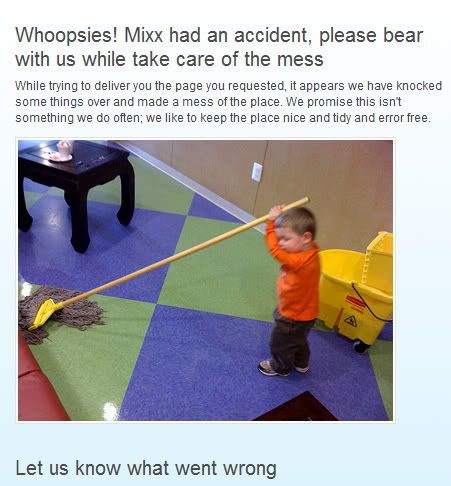
Posted by Seely at 8:43 AM 0 comments
Labels: mixx, social bookmarking, social media
I get tired of reading 50+ articles a day about Facebook and Twitter, so I try to subscribe to some more “fun” blogs. It breaks up the monotony and give my brain a break for a second. I subscribed to This is Why You’re Fat last week, and this week I came across another gem—Forgotten Bookmarks.

At first, I assumed it was something to do with organizing my chaotic list of bookmarks in Firefox. Come to find out, it is actually a photo-journal of sorts from a rare/antiquarian bookseller, cataloguing some of the more interesting and unusual bookmarks found left in volumes they have received.
The front page description reads:
I work at a used and rare bookstore, and I buy books from people everyday. These are the personal, funny, heartbreaking and weird things I find in those books.
My family was adept at forgetting bookmarks apparently, as nearly every antique book I own is stuffed with markers, newspaper clippings and even in some cases, hundred-year-old pressed flowers. I’ve always enjoyed finding these hidden treasures, and its pretty cool to see some other folks leavings.
So there you have it: Forgotten Bookmarks, now part of my daily break from the social-media blog-o-sphere.
Posted by Seely at 12:36 PM 0 comments
We won… Facebook has rescinded their TOS and returned to the original one. Its rare to see this happen, but kudos to Facebook for making this decision in the favor of their users.
Posted by Seely at 11:15 PM 1 comments
 In response to the wake of recent criticism and controversy stirred up by Facebook’s change to their Terms-of-Service, Facebook’s Mark Zuckerberg sat down to answer some questions. Unfortunately, no one asked him the right questions. Zuckerberg said in defense of Facebook’s new policies:
In response to the wake of recent criticism and controversy stirred up by Facebook’s change to their Terms-of-Service, Facebook’s Mark Zuckerberg sat down to answer some questions. Unfortunately, no one asked him the right questions. Zuckerberg said in defense of Facebook’s new policies:
“When a person shares information on Facebook, they first need to grant Facebook a license to use that information so that we can show it to the other people they’ve asked us to share it with. Without this license, we couldn’t help people share that information,” stated Mark Zuckerberg on the Facebook blog. “One of the questions about our new terms of use is whether Facebook can use this information forever. When a person shares something like a message with a friend, two copies of that information are created—one in the person’s sent messages box and the other in their friend’s inbox. Even if the person deactivates their account, their friend still has a copy of that message. We think this is the right way for Facebook to work, and it is consistent with how other services like email work. One of the reasons we updated our terms was to make this more clear.” (pulse2.com)
While this does address some of the concerns raised, it leaves out most of the more troubling portions of the changed clause. The new controversial clause reads as follows:
You hereby grant Facebook an irrevocable, perpetual, non-exclusive, transferable, fully paid, worldwide license (with the right to sublicense) to (a) use, copy, publish, stream, store, retain, publicly perform or display, transmit, scan, reformat, modify, edit, frame, translate, excerpt, adapt, create derivative works and distribute (through multiple tiers), any User Content you (i) Post on or in connection with the Facebook Service or the promotion thereof subject only to your privacy settings or (ii) enable a user to Post, including by offering a Share Link on your website and (b) to use your name, likeness and image for any purpose, including commercial or advertising, each of (a) and (b) on or in connection with the Facebook Service or the promotion thereof.
The troubling portions of the clause, none of which were addressed, are emphasized in bold for your reading pleasure. Many users feed their blogs through Facebook as a way of keeping friends updated on new posts. Actually, if I did my math right, about 1/4 of the people who read my blog post will be reading this on Facebook. According to the new TOS, my blog, because it is fed through Facebook, is theirs to use at their discretion.
What may be even more troubling is the portion that reads “including by offering a Share Link on your website…”. How many websites offer Facebook share-links on their website? It is without a doubt well into the millions. Most any blog or online publication knows that a Facebook share-link is a sure-fire way to attract readers. Does this mean just the presence of a Facebook submission button constitutes the legal right for Facebook to distribute the information at their discretion and wont?
Alexander van Elsas saw right through the shallow response to the most benign of the TOS’s changes. In his (as always) outstanding post Mark Zuckerberg is Answering the Wrong Question, and We Fell for it Again, Van Elsas writes:
…I cannot help but feel that the blogging community has let Mark get away with answering the wrong question. He has done a perfect job in avoiding a much more important privacy issue than the issue that arises when two people share information via Facebook.
The questions Mark should have answered are the following:
What exactly does Facebook do with all the user data has been collected on Facebook, and how exactly does it monetize that, even after a user has deleted his or her account?
I could care less about the information I share with others via Facebook. That sharing process is a conscious act. I know that if I share that whatever gets shared is out of my control. What I do not know is what Facebook does with that information. Why do they tap into all of my interactions and my data? What do they store, and how do they monetize that exactly? If I set my privacy settings as strict as possible do they still see everything? How is that data being used outside of Facebook? Do 3rd parties get access to that information as well, even if I do not want them too?
The problem at hand isn’t users sharing things on Facebook. It isn’t even controlling privacy on Facebook. The problem is that I do not have a clue or option to protect myself from Facebook. Any service that monetizes user data and interactions indirectly using a free but advertisement business model puts the value of the network in front of the value of the individual user. You get a free service, but you do not know exactly what you are giving up for that. And that is what Mark should be explaining. The rest is just a decoy so that the really difficult questions do not need to be answered.
I might not even mind that Facebook monetizes my user data, my friends, and my interactions. But right now, I don’t know how Facebook uses that data.We might think that our online lives are not connected to our real lives. We might even think that privacy is dead. But the problem is not that privacy is dead, but that it is distributed unevenly. In other words, the user is forced into total transparency when signing up for services like Facebook. But the service itself lacks transparency. There is no way we are going to find out what Facebook does with us. And it is this unbalanced relationship that we should be worried about. Mark Zukcerberg does a great job answering the wrong question, and we all fell for it again.
Are Facebook users truly satiated by this non-response by Zuckerberg? It seems that for now the controversy has died down, despite a distinct lack of questions of consequence being answered. It seems that the same users who let Facebook’s TOS nearly slip past them were just as easily duped by Zuckerberg’s non-answer. The same users who were shocked to learn that Flickr, Gmail, Yahoo, Tumblr and most other popular social networking services have similar TOS’s to Facebook's revised version. Fool us once, shame on you, fool us again--shame on us.
Alexander van Elsa had it right when he said Zuckerberg duped us again. I have a feeling this won’t be the last time.
Posted by Seely at 3:46 PM 0 comments
Labels: controversy, facebook, TOS, zuckerberg
 Mashable and The Consumerist broke the news today that there’s been a significant change to Facebook’s Terms-of-Service (or “TOS”). There is a flurry of speculation as to what exactly the changes mean, but one thing is clear: Facebook more or less owns any content you publish on their site, and your account can never be deleted. So, anything you put on Facebook is probably going to follow you around for awhile. Check out the new TOS paragraph:
Mashable and The Consumerist broke the news today that there’s been a significant change to Facebook’s Terms-of-Service (or “TOS”). There is a flurry of speculation as to what exactly the changes mean, but one thing is clear: Facebook more or less owns any content you publish on their site, and your account can never be deleted. So, anything you put on Facebook is probably going to follow you around for awhile. Check out the new TOS paragraph:
You hereby grant Facebook an irrevocable, perpetual, non-exclusive, transferable, fully paid, worldwide license (with the right to sublicense) to (a) use, copy, publish, stream, store, retain, publicly perform or display, transmit, scan, reformat, modify, edit, frame, translate, excerpt, adapt, create derivative works and distribute (through multiple tiers), any User Content you (i) Post on or in connection with the Facebook Service or the promotion thereof subject only to your privacy settings or (ii) enable a user to Post, including by offering a Share Link on your website and (b) to use your name, likeness and image for any purpose, including commercial or advertising, each of (a) and (b) on or in connection with the Facebook Service or the promotion thereof.
Yikes. Photographers—take note. You probably want to start watermarking or digitally signing your photographs. I’d recommend a huge, ugly watermark right across the photo. As a writer that feeds his blog through his Facebook account, this has left me to wonder if my blog, though published externally, is also subject to this new clause. Would my posts then become the property of Facebook, to be re-used and re-purposed at their discretion?
As disturbing as the new TOS may seem, there is something much more disturbing brought to light by the controversy sparked by this change. The fact is, Facebook’s new clause in their TOS is closer to an industry standard than an exception. The outrage sparked by the changes highlights how few users actually read TOS’s when signing up for an online service. Even Google’s Gmail service, despite Google’s benign and egalitarian image, has a clause almost identical to Facebook’s controversial clause.
If anything comes out of this, I am hoping it will be a renewed interest in TOS agreements, as painfully long and boring as they are. Rarely do I take the time to read a TOS agreement anymore, but Facebook has reminded us just how far the implications & consequences of glossing over a TOS contract could extend.
Looks like Cash4Gold created a new Twitter account after their original was suspended. They must be doing some reputation monitoring as I received this tweet within an hour of publishing a post regarding the investigation of their previous Twitter account.
Posted by Seely at 4:42 PM 0 comments
I’ve been keeping up with Cash4Gold on Twitter for the past week, and noticed I hadn’t received any tweets from them lately. I wasn’t particularly sad, as most of their tweets were self-serving propaganda and pro-gold drivel. I was, however, curious. I checked out their Twitter page and was greeted by this message:
 Interesting. I have to admit that I am curious as to what they could have done to warrant being investigated by Twitter. Was it the constant stream of propaganda? Did they try to add too many people at once? Were they harassing other Twitter users that dared mention their name? My guess would be the latter, given the way their PR firm’s lawyer so boldly threatened fivemilliondots.com with a defamation lawsuit. As I previously mentioned, their whole PR strategy seems rather inept and inadequate to say the least.
Interesting. I have to admit that I am curious as to what they could have done to warrant being investigated by Twitter. Was it the constant stream of propaganda? Did they try to add too many people at once? Were they harassing other Twitter users that dared mention their name? My guess would be the latter, given the way their PR firm’s lawyer so boldly threatened fivemilliondots.com with a defamation lawsuit. As I previously mentioned, their whole PR strategy seems rather inept and inadequate to say the least.
Nothing hurts PR worse than sending a threatening letter to a blogger. Oh, except for offering a blogger cash to kill a story critical of your company. The value of a cash settlement pales into comparison to the value of sensationalism generated by a blogger being threatened with a lawsuit or tempted with a bribe.
Mack Collier (Marketing Profs) has four steps for handling negative feedback in the blog-o-sphere that would have greatly benefited Cash4Gold, and maybe even saved or at least moderated their online reputation:
1 - If someone is leaving negative comments about your company, respond.2 - Be thankful and polite. Nothing escalates a negative comment into a full-bore flamewar faster than an 'Oh yeah?!?' reply from the company.
3 - If commenters are jumping to the wrong conclusion about your company, kindly correct them with the proper information.
4 - Thank them for their feedback, and encourage them to provide more. Leave your email address so they can contact you off the blog, if they choose.
If you are thankful and respectful toward commenters, even those that are attacking your company, the end result will almost always be a positive experience.
Posted by Seely at 1:35 PM 0 comments
Labels: cash4gold, public relations, twitter

I recently read an outsdanding post titled Futurology is Not a Real Career; Futurism Sites Suck. The article deftly pulled apart the so-called field of "Futurology", which often crosses paths with social media and marketing.
Ms. Alana Taylor, the post's author and venerable social media maven, liked my comment enough to publish it in a follow-up to the original post. I'm flattered to say the least! I highly recommend reading the original article and the subsequent follow-up.
Posted by Seely at 7:16 AM 0 comments
Labels: alana taylor, changification, futurism
I need to take a second to gloat. A coworker noticed a familiar headshot on the front page of Mixx today. I was trying to figure out why I had so many new followers today...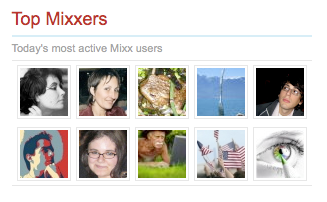
Posted by Seely at 9:04 AM 0 comments
Labels: mixx, social bookmarking, social media
Posted by Seely at 6:47 AM 0 comments
Labels: obama, social media, whitehouse
 Recently, I stumbled across a new Twitter app with a funny name (as most of them have) called Uladoo. Uladoo is a very easy and simple way to create running charts of anything you could think of.
Recently, I stumbled across a new Twitter app with a funny name (as most of them have) called Uladoo. Uladoo is a very easy and simple way to create running charts of anything you could think of.
At a glance, users are currently testing it out with categories such as calories, doo (the kind a dog does), telekinesis, packed lunches, miles walked and many others. Setup is simple. To create a chart, simply tweet a name of a chart and a value @uladoo.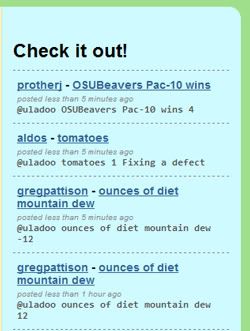
For example: @uladoo miles walked 1.8
 Curious to see how it looks? Check out my charts at http://www.uladoo.com/seelowitz.
Curious to see how it looks? Check out my charts at http://www.uladoo.com/seelowitz.
Posted by Seely at 1:47 PM 0 comments

The folks over at 97th Floor have released a new version of their popular (and free) Social Media toolbar geared specifically towards FireFox 3.x users. I have known about this toolbar for some time but have neglected to install it due to a longstanding hatred of over-cluttered browsers and half-functional, largely unnecessary add-ons. Well, I was wrong on this one. Its brilliant. 97th Floor's toolbar combines everything I love in an add-on.
97th Floor's toolbar is:

Posted by Seely at 8:46 AM 0 comments
Labels: firefox, social bookmarking, social media
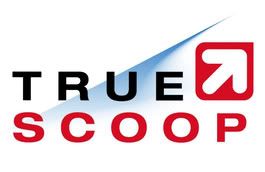 I'm not kidding. Someone finally created an app that essentially works like PeopleSearch and runs a public background/criminal record search on any of your Facebook buddies. Its called TrueScoop. If you want to see how it works, I recommend the writeup over at AllFacebook News.
I'm not kidding. Someone finally created an app that essentially works like PeopleSearch and runs a public background/criminal record search on any of your Facebook buddies. Its called TrueScoop. If you want to see how it works, I recommend the writeup over at AllFacebook News.
This app is particularly alarming the wake of recent Facebook blackmail scams, wherein hapless (albeit somewhat stupid) Facebook'rs were duped into paying a fake Facebook hottie not to post the nude pics they had sent "her". Now, its even easier to dig up some skeletons and bring them out of the closest--by posting them on your wall.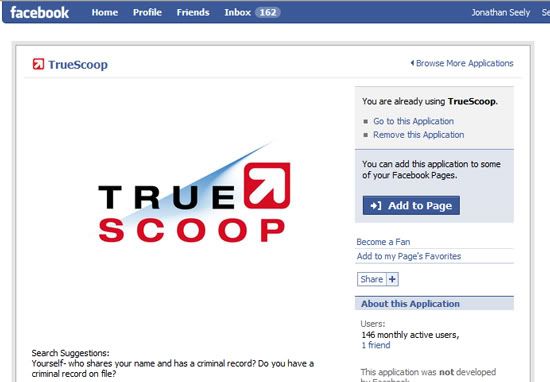
What are the implications? Well, suppose a thoughtless friend were to post your record on his wall? Do you know how it would read? Also, as pointed out in the AllFacebook writeup, there are multiple occurences of most names. I know there are numerous Jonathan Seely's, and I would not want anyone confusing their misdeeds with this Jonathan Seely.
In light of privacy concerns TrueScoop raises, I encourage anyone who values their reputation (this would apply especially to those in the business world) to block this Facebook app. It serves no other purpose than to dig up dirt, and all it takes for that dirt to become public knowledge is one careless click.
Edit: I created a group protesting this new app on Facebook... join us if you feel this app has gone too far.
Posted by Seely at 1:13 PM 0 comments
 I was surprised to overhear at the office today that the infamous sell-your-jewelry-get-cash consortium "Cash4Gold" has established a presence in the Web 2.0-sphere. I decided to check them out on Twitter, and as I suspected its mostly pro-Cash4Gold propaganda being shelled at followers, with some damage control thrown in for good measure. They are, afterall, involved in a lawsuit for term-infringement and under investigation by the Florida attorney general.
I was surprised to overhear at the office today that the infamous sell-your-jewelry-get-cash consortium "Cash4Gold" has established a presence in the Web 2.0-sphere. I decided to check them out on Twitter, and as I suspected its mostly pro-Cash4Gold propaganda being shelled at followers, with some damage control thrown in for good measure. They are, afterall, involved in a lawsuit for term-infringement and under investigation by the Florida attorney general.
I question the wisdom of their decision to enter into the web-o-sphere. It seems largely motivated by a desire to do some reputation-building and damage control, both of which I'm confident could easily backfire on them. With all the negative press surrounding their business, Cash4Gold is making themselves extremely vulnerable to vengeful consumer attacks.
We've seen in the past how a web presence of a less-than-reputable company can backfire. Admittedly, this is less underhanded than the infamous fake Walmart blog, but consumers generally meet such attempts at spin control with hostility and warranted skepticism.
Sox First has some great advice on their list of six ways to avoid PR disasters that Cash4Gold would be wise to follow:
2.Be upfront providing the public with information and apologise. But won't an apology increase the risk of litigation? Not necessarily. There are hundreds of different ways of saying sorry without jeopardising your legal position, but in the end, you need to express regret and sympathy. Otherwise, you just come out looking like you're protecting your backside.So far, its not looking great for Cash4Gold if we're grading against the above rubric. Rather than create a plan to stop their vulnerabilities from opening up, they have opened themselves up for a backlash of consumers in a public setting. Chances are, even if they do offer some rebuttal to claims, it will fall on deaf ears of consumers who have already made up their minds.
3. Go out of your way to show you are doing everything possible to solve the problem.
4. Identify your vulnerabilities, find ways to stop them blowing up, have a plan for what to do when the worst happens and keep the plan updated.
5. Develop strong relations with employees and customers.

Posted by Seely at 9:31 AM 0 comments
Labels: cash4gold, social media, twitter
You may notice the formatting looks a little weird, page elements are being moved around, or something may be a bit askew. No worries--its just me trying to tweak my blog layout a bit. I'm amazed how fast I forgot HTML.
Posted by Seely at 8:08 PM 0 comments
Labels: html
Okay, I figured out the first word, but anyone got any guesses on that second one? I typed in 'pneumonia' which is nowhere near correct and surprisingly--it was accepted.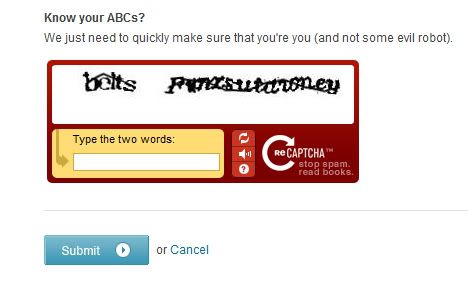
Posted by Seely at 8:51 AM 0 comments

I get coffee first thing every morning. My day can't start without it. Fancying myself an evironmentalist of sorts, as well as a frugal West Michigander, I decided to purchase a mug at the coffee bar I frequent for $5.99, which then entitles me to $1.25 refills of their delicious coffees. I'm killing two birds with one stone. I'm saving the environment by keeping landfills clear of waste with my reusable mug, and saving myself a few coins while I'm at it. Win-win situation.
I'm afraid it is not quite that simple.
Lately, I've been plagued with doubts. We are constantly told to "reduce, reuse and recycle", but in some cases I firmly believe a disposable product can actually have less environmental impact than its reusable counterpart.
Let's analyze the plastic cup first. First the pros:
Posted by Seely at 2:57 PM 0 comments
Labels: environment, sustainability
communication//marketing//social media